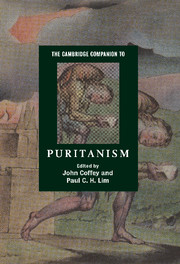4 - The Puritan Revolution
from Part I: - English Puritanism
Published online by Cambridge University Press: 28 November 2008
Summary
The crisis that overwhelmed Britain and Ireland in the mid seventeenth century has no agreed title: the English Revolution, the Great Rebellion, the Civil Wars and Interregnum, England's (or Britain's) War(s) of Religion, the War(s) of the Three Kingdoms, the Puritan Revolution. The last had a limited shelf life - coined by S.R. Gardiner in 18761 and used in the title of his influential collection of Constitutional Documents of the Puritan Revolution 1625-1660 (1889) but not in his great multi-volume history of the period. It was promoted hard by American historians (especially literary historians) between the 1930s and the 1960s and then abandoned. It is certainly not how any Puritan at the time described what they were living through. It has existed to describe a process but not its outcome. The case for calling the crisis a Puritan Revolution is strongest in relation to the struggle to 'reform the reformation' in the period 1640-6, and - quite separately - to describe the 'teeming liberty' of the years 1646-53, when ecclesial discipline broke down and hundreds of 'gathered churches' formed in towns and villages outside the parish system, some defining themselves doctrinally (the Particular and General Baptists, the Fifth Monarchists) and others by their charismatic leaders (the Muggletonians). When Oliver Cromwell became head of state in December 1653, some stability was achieved, with a state church that grew out of Puritan experience and evangelistic zeal, but with a broad measure of liberty for those who did not seek to disturb the peace of others. But there was still plenty of contention and recrimination (with the Quakers at the centre of the maelstrom).
- Type
- Chapter
- Information
- The Cambridge Companion to Puritanism , pp. 67 - 88Publisher: Cambridge University PressPrint publication year: 2008
- 3
- Cited by



